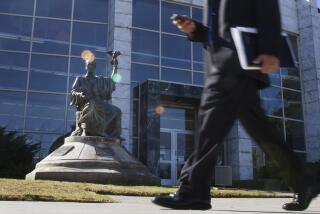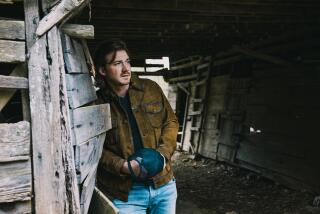Roger Manning “Roger Manning”<i> Shimmy-Disc</i>
- Share via
Manning is America’s answer to Billy Bragg, a singer-songwriter who marries folk music’s traditions of storytelling and left-wing rabble-rousing to rock ‘n’ roll’s aggressive spirit.
Manning, a New Yorker, is no match for Bragg, an Englishman, when it comes to crafting a graceful melody (Bragg qualifies as one of pop’s better recent-vintage writers of romantic songs). But on his second album, following a debut on SST Records in 1989, Manning keeps his songs about romance and personal quests interesting; the sheer vigor of his delivery makes up for his ungainly, scratchy yelp of a singing voice. There’s a constant, restless rhythmic motion at play as Manning strums fast rattling cadences on his acoustic guitar, backed by spare drums and upright bass.
Motion--mental, emotional and physical--is a near constant theme in songs that tell of loves sought and abandoned along the trail of experience. Manning permits himself some rueful reflections on opportunities lost and loves squandered, but his ready wit and ever-present energy evoke a sense of possibility that doesn’t allow melancholy to fester. After confessing numerous sins at the start of “The 19 Blues,” a lament of yet another love affair in collapse (“I don’t drink, I don’t smoke, I don’t do any drugs, I just manipulate people and mess up their lives”), Manning recovers sufficiently to try this come-on line on a new prospect: “Hey, you ain’t perfect, I ain’t perfect, we’ve got so much in common. . . .”
On political songs, Manning’s squirrelly voice allows him (unlike the chesty, always-forceful Bragg) to get away with self-righteous, hard-left opining without sounding too strident. Like most listenable agitpop, these numbers succeed more as manifestations of attitude, personality and emotion than as political analyses. Manning applies bratty humor to his dis-the-cops broadside “Tompkins Square Blues,” one of four live, solo-acoustic numbers that end the album after eight studio tracks with a band dubbed the Soho Valley Boys.
In “The Pacifica Blues,” there’s a winning innocence and rejection of cynicism in Manning’s insistence that protest songs can carry enough truth to motivate social action. “The Radical Blues” carries a fierce declaration of independent thought and aversion to patriotic groupthink: “If I ever love this country, it’ll be one person at a time. . . . I ain’t no radical, I just got my eyes open.” What Manning sees and thinks comes across with enough verve to make him a good bet for folkies who want something a little more edgy than usual, and punks who want something a little more verbal than usual.
(Shimmy-Disc, JAF Box 1187, New York, N.Y. 10016).
More to Read
The biggest entertainment stories
Get our big stories about Hollywood, film, television, music, arts, culture and more right in your inbox as soon as they publish.
You may occasionally receive promotional content from the Los Angeles Times.











